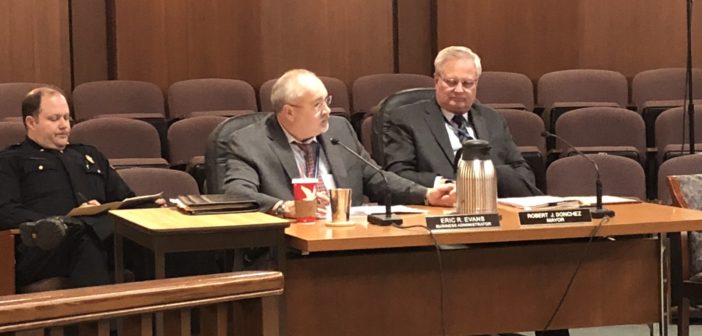Bethlehem council members breathed a collective sigh of relief when Police Chief Mark DiLuzio announced a new directive for his officers — about an hour in to the at-times contentious Public Safety meeting.
DiLuzio said in the coming days, he will issue a new directive to his officers regarding how to handle marijuana cases in the Northampton County portion of Bethlehem. Officers will now have the option, when encountering an individual in possession of marijuana, to charge them with both the state misdemeanor offense and the city ordinance.
The officers will effectively “punt” the decision to the elected district magistrate judge, who will make the final determination.
From there, the judge can either throw out the misdemeanor charge or uphold the misdemeanor and send it to the county court and the district attorney’s office. DiLuzio said he checked with Northampton County DA Terry Houck about the directive, and he agreed to stand behind it. Officers will now be able to charge an individual with both the misdemeanor and city ordinance, or only the summary offense, but not solely the misdemeanor offense.
Only the misdemeanor charge will apply in the Lehigh County section of Bethlehem. Lehigh County DA Jim Martin will only consider the state misdemeanor law as valid in regard to marijuana violations.
The meeting was announced in part in response to a letter by District Magistrate Judge Nancy Gonzalez, as reported by The Brown and White, which criticized the disparity by which Lehigh Police and Bethlehem Police prosecute marijuana violations. At the Feb. 18 council meeting, Mayor Robert Donchez also addressed another piece of the marijuana controversy, which revolved around a September incident in which police pulled a Bethlehem man over and found a small amount of marijuana in his car.
The Brown and White filed a “right to know” request to view the audio and video evidence Donchez cited in the city’s investigation of the incident. The incident led to complaints being filed against DiLuzio and Magistrate District Judge Nicholas Englesson. The city denied the right to know request on the basis that the incident in question occurred over 60 days ago, the filer does not have a “relationship” to the incident, and the material sought could be considered “investigative information.”
DiLuzio provided an update of his department’s enforcement of the city decriminalization ordinance, which provides officers discretion to either apply the state misdemeanor or write the offender a ticket if the individual possesses 30 grams or less of marijauana.
Between the implementation of the ordinance in July 2018 through January 2020, BPD has conducted 289 total arrests for minor marijuana possession. Of those, 270 were charged under the state misdemeanor law — over 90 percent. The remaining 19 arrests were done through the city ticket offense.
Of the 289 arrests, 127 arrests occurred in the South Side, along with nine of the 19 city ordinances. DiLuzio reported that 10 of the 19 city ordinances were issued to Hispanics, five to whites and four to blacks. Of the 270 misdemeanor charges, 76 were white, 71 were black, 121 were Hispanic and two were other races.
LUPD reported five arrests in 2019 related to marijuana possession. Four out of the five were prosecuted through the city ordinance, and one was given the misdemeanor charge.
“We’re not out there hunting down people and jumping out of bushes to arrest people for weed,” DiLuzio said.
DiLuzio went on to cite an internal survey he conducted of the officers in his department. Out of 117 respondents, 44 percent of Bethlehem officers support decriminalization in general, while 56 percent are opposed.
But of those same officers, 97 percent of respondents said the state should be the one to decriminalize marijuana — not through a city ordinance.
“They want the law to be universal across the state,” DiLuzio said. “They don’t feel good using the city ordinance because somebody can claim… ‘I got a misdemeanor because I’m black,’ while another guy…. could be white and get a citation. And now you have an issue here, and cops don’t want to get caught in the middle of this.”
The new directive, therefore, would allow the decision of how to prosecute marijuana cases to be taken out of the officers’ hands, if they choose, and into the judicial system.
Still, city council took issue with the enforcement of the city law.
“I think as a city we can be doing more,” said Councilman J. William Reynolds. “A lot of times, these things don’t come down to legalities or illegalities, but it’s what kind of city we want to live in.”
DiLuzio said he understands council members’ frustration and was hoping the city ordinance would be used more, too. But he also cautioned that LUPD’s sample size is far smaller than BPD’s when it comes to marijuana arrests.
Councilwoman Paige Van Wirt said there are clear geographic boundaries for officers to follow based on where the marijuana violation occurs in the city.
“I just don’t buy that argument, frankly,” she said. “I think that your officers have the exact geographic ability to apply the law where County DA Martin wants it applied his way, and where we have given them the… encouragement to use the decriminalization ordinance to apply the law over (in Northampton County) differently… But they’re not doing it… And I think that’s in part because the tone is set by the leader.”
DiLuzio said, while he personally supports decriminalization, he believes it should come from the state legislature. He emphasized that he stands “100 percent” behind his officers.
“I have great respect for you and the officers of Bethlehem,” Van Wirt said. “I also have great respect for data. These numbers are telling a very troubling story…. We’re not waiting for Harrisburg because we believe in local power.”






Comment policy
Comments posted to The Brown and White website are reviewed by a moderator before being approved. Incendiary speech or harassing language, including comments targeted at individuals, may be deemed unacceptable and not published. Spam and other soliciting will also be declined.
The Brown and White also reserves the right to not publish entirely anonymous comments.